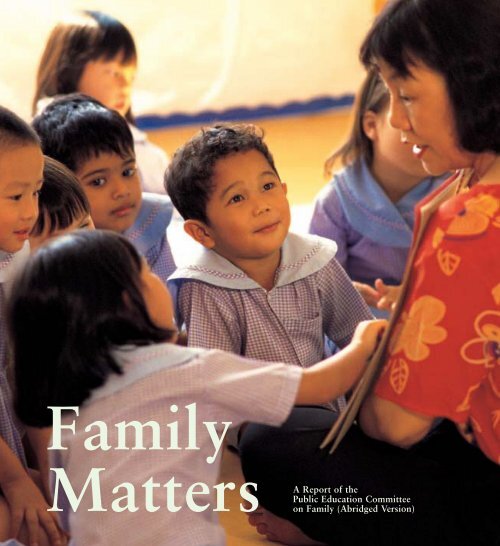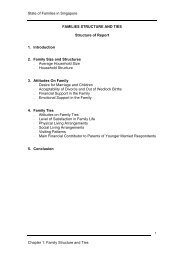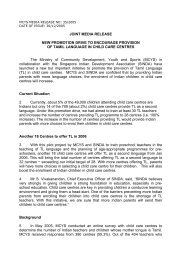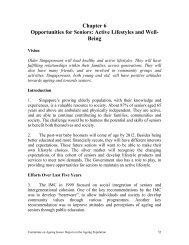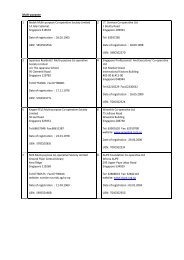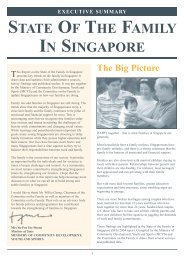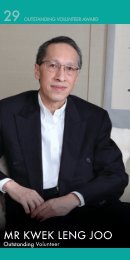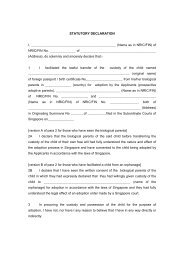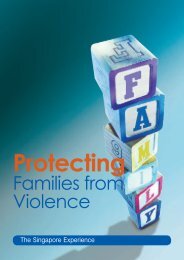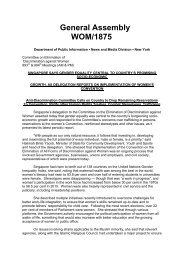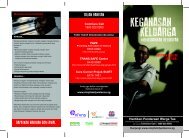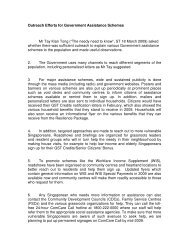Family Matters A Report of the
Family Matters A Report of the
Family Matters A Report of the
You also want an ePaper? Increase the reach of your titles
YUMPU automatically turns print PDFs into web optimized ePapers that Google loves.
<strong>Family</strong><br />
<strong>Matters</strong> A<br />
<strong>Report</strong> <strong>of</strong> <strong>the</strong><br />
Public Education Committee<br />
on <strong>Family</strong> (Abridged Version)
Cover:<br />
Mdm Seet Meng Kiaw holds her<br />
pupils in rapt attention during story<br />
telling at <strong>the</strong> Children Learning<br />
Centre in MCDS, a family-friendly<br />
organisation that provides childcare<br />
facilities for its staff.
<strong>Family</strong> <strong>Matters</strong><br />
A <strong>Report</strong> <strong>of</strong> <strong>the</strong><br />
Public Education Committee<br />
on <strong>Family</strong> (Abridged Version)<br />
January 2002
Risk Manager Leonard Chuah shares<br />
a precious moment <strong>of</strong> joy with wife<br />
Audra on <strong>the</strong> arrival <strong>of</strong> <strong>the</strong>ir second<br />
child, Ethan, at <strong>the</strong> KK Women’s and<br />
Children’s Hospital.
<strong>Family</strong> matters<br />
<strong>Family</strong> matters because family brings love, joy and warmth.<br />
It is our anchor in an ever-changing, fast paced world.<br />
Some may perceive that marriage and family are private matters,<br />
and that choices should be left to <strong>the</strong> individual. However, <strong>the</strong>se<br />
can have collective impact on our nation. When families break down<br />
and fail to provide support for <strong>the</strong>ir members, <strong>the</strong> effects reverberate<br />
across society. Therefore it is important for <strong>the</strong> entire community to<br />
support <strong>the</strong> formation and streng<strong>the</strong>ning <strong>of</strong> families.<br />
When <strong>the</strong> community and <strong>the</strong> government work toge<strong>the</strong>r to create<br />
an environment that is conducive to marriage, families and raising<br />
children – by shaping values, attitudes and life choices – it is<br />
because family matters. To each <strong>of</strong> us. To Singapore.<br />
3
Mr. and Mrs. Goh Tee Soon,<br />
retirees and married for over<br />
30 years, share a quiet<br />
moment at a park.
CONTENTS PAGE<br />
1 Introduction 7<br />
2 Back to basics 11<br />
3 <strong>Family</strong> values 12<br />
4 Public education on family 13<br />
5 Imbuing <strong>the</strong> young with positive values towards <strong>the</strong> family 15<br />
6 Reinforcing marriage as a lifelong commitment 18<br />
7 Promoting family life and <strong>Family</strong> Life Education for all 21<br />
8 Creating a family-friendly environment 24<br />
9 <strong>Family</strong> matters 27<br />
Annex: Public Education Committee on <strong>Family</strong> 28<br />
5
Legal Officer Janice Song teases<br />
her son, Jared, as she changes<br />
his diapers at Great World City,<br />
one <strong>of</strong> many family-friendly<br />
public places with Parent<br />
Rooms complete with diaperchanging<br />
facilities.
Do we know how our young think today or what<br />
worries <strong>the</strong>m?<br />
If you are still wondering, here is a possible peek into<br />
<strong>the</strong>ir minds:<br />
• A 2000 Singapore Press Holdings study on <strong>the</strong><br />
attitudes and lifestyles <strong>of</strong> children aged 10 to 12<br />
showed that more feared ‘failing tests and<br />
examinations’ (36%) than ‘parents or guardians<br />
dying’ (17%).<br />
• In a 2000 National Youth Council (NYC) survey<br />
on Singapore’s Youth Values, Beliefs and<br />
Concerns, <strong>the</strong> respondents’ top wish was ‘to lead<br />
a lifestyle that I desire’ (39%). Ranked lowly<br />
were ‘to set up a family’ (7%), ‘to help <strong>the</strong> needy’<br />
(2%), and ‘to contribute to <strong>the</strong> growth <strong>of</strong> our<br />
society’ (2%).<br />
• In <strong>the</strong> same NYC survey, 34% said ‘ok to<br />
pre-marital sex’, while 26% felt that divorce was<br />
all right. Some 32% said that living toge<strong>the</strong>r as a<br />
couple before getting married was a good idea<br />
while 27% felt that marriage was not necessarily<br />
a key to happiness.<br />
1<br />
Introduction<br />
7<br />
• In a Social Development Unit (SDU) survey done<br />
in 2000 on Singles’ Attitudes towards Courtship<br />
and Marriage, working single adults said that<br />
financial security, success in career and owning a<br />
home were <strong>the</strong> top three life goals in <strong>the</strong> next five<br />
years. Marriage and parenthood took a backseat.<br />
All <strong>the</strong> above are indeed worrying; yet, <strong>the</strong>y are<br />
merely symptoms <strong>of</strong> a larger concern.<br />
Singapore’s progress: benefits and costs<br />
Singapore today has changed much, compared to<br />
over 20 years ago, thanks to globalisation, advances<br />
in new technology and <strong>the</strong> explosion <strong>of</strong> <strong>the</strong> Internet.<br />
These changes have resulted in many benefits.<br />
Singaporeans are more cosmopolitan and open to<br />
different ideas and views; job opportunities are no<br />
longer confined to just <strong>the</strong> island city but increasingly,<br />
Singaporeans are going overseas to study and work<br />
for long periods <strong>of</strong> time. They become more<br />
internationalised, and more marketable globally.<br />
These changes have also opened up Singapore and<br />
created more choices in every aspect <strong>of</strong> life: from a<br />
more vibrant arts scene, to a greater variety <strong>of</strong> food<br />
and entertainment, not to mention more opportunities
to work harder and make more money and lead <strong>the</strong><br />
lifestyles we all hope for. The quick and easy access<br />
to information also means that business deals can be<br />
clinched – or lost – in minutes.<br />
There is no doubt that today’s new economy has<br />
changed <strong>the</strong> way we live and work, think and relate<br />
to o<strong>the</strong>rs. In many ways, this has been for <strong>the</strong> better.<br />
In o<strong>the</strong>r ways, however, this comes with a price.<br />
Evolving an alternative lifestyle. For young<br />
Singaporeans, marriage <strong>the</strong>se days is no longer seen<br />
as lifelong, nor is it necessary for <strong>the</strong>m to get married<br />
before having sex. Commitment to marriage does<br />
not gel with <strong>the</strong> rising individualism and freedom in<br />
a ‘me-first’ society, where self-gratification is more<br />
important.<br />
These observations are obvious in <strong>the</strong> alternative<br />
marriage practices and ideologies that are depicted<br />
on television <strong>the</strong>se days, e.g., sitcoms and movies<br />
depict couples staying toge<strong>the</strong>r without getting<br />
married. Increasingly, couples are re-defining <strong>the</strong>ir<br />
marriages to suit <strong>the</strong>ir lifestyles and needs.<br />
8<br />
Sociologists overseas have observed a growing trend<br />
<strong>of</strong> ‘serial monogamy’, where couples are dedicated to<br />
<strong>the</strong>ir marriage for as long as it benefits <strong>the</strong>m. When<br />
<strong>the</strong>ir needs are not met, however, <strong>the</strong> relationship<br />
becomes a throwaway item.<br />
There are no hard numbers to suggest that such<br />
‘sitcom lifestyles’ are prevalent here. Yet, anecdotal<br />
evidence indicates that <strong>the</strong>re is a rising number <strong>of</strong><br />
such cases.<br />
Singaporeans are marrying late (if at all). According<br />
to Dr. Stella R. Quah’s 1999 ‘Study on <strong>the</strong> Singapore<br />
<strong>Family</strong>’, younger and well-educated couples are<br />
close, and married Singaporeans are very satisfied<br />
with married life. But that is only if <strong>the</strong>y get married<br />
in <strong>the</strong> first place.<br />
Increasingly, Singaporeans are marrying later and/or<br />
remaining single. The Census 2000 revealed that<br />
singlehood rates are significant and <strong>the</strong>y continue to<br />
rise. Many Singaporeans delay marriage to build up<br />
<strong>the</strong>ir careers. Some are simply put <strong>of</strong>f by high<br />
wedding expenses.
Men and women are sometimes faced with<br />
mismatched expectations. In some cases, <strong>the</strong> lack <strong>of</strong><br />
dating opportunities and interpersonal skills worsen<br />
<strong>the</strong> problem. Marriage is also increasingly seen in<br />
practical terms, where couples may marry early just<br />
to buy a Housing & Development Board flat.<br />
And <strong>the</strong> cracks have started to show. The average<br />
age at first marriage for men and women have<br />
increased by 2.5 years between 1980 and 2000 to<br />
29.8 and 26.8, respectively. The number <strong>of</strong> divorces<br />
has also gone up. From 1988 to 1998, <strong>the</strong> number <strong>of</strong><br />
divorces under <strong>the</strong> Women’s Charter rose 140% from<br />
1,643 to 3,924; and that under <strong>the</strong> Muslim Law Act<br />
rose 64%, from 893 to 1,465 cases. At <strong>the</strong> same time,<br />
<strong>the</strong> 2000 marriage rate at 47.1 per 1,000 unmarried<br />
residents was <strong>the</strong> lowest recorded in 20 years.<br />
The work-family balancing act. Increasingly,<br />
parents find <strong>the</strong>mselves burning <strong>the</strong> candle at both<br />
ends as <strong>the</strong>y struggle to balance work and family.<br />
Many are in dual-income families and, as a result,<br />
<strong>the</strong>y don’t have enough time for <strong>the</strong>ir children.<br />
9<br />
These working parents instead become dependent on<br />
foreign maids and childcare centres to do <strong>the</strong> job.<br />
Often, out <strong>of</strong> guilt, <strong>the</strong>y give in to <strong>the</strong>ir children’s<br />
demands, only to raise children who take <strong>the</strong> good<br />
things in life for granted. This reinforces <strong>the</strong> wrong<br />
values and affects <strong>the</strong> children’s overall development.<br />
Growing up, <strong>the</strong>se children pay attention only to<br />
academic and materialistic pursuits. They are<br />
disinterested and unconcerned about o<strong>the</strong>r aspects <strong>of</strong><br />
development like building healthy relationships<br />
with o<strong>the</strong>rs. In Japan, some schools now teach<br />
communication skills to counter <strong>the</strong> one-child<br />
family trend that is producing children who are<br />
socially inept.<br />
These challenges raise a major concern: What kind<br />
<strong>of</strong> persons will Singapore’s young become in <strong>the</strong><br />
future? What kind <strong>of</strong> values will <strong>the</strong>y embody?
Student Denise Hoe<br />
guides her younger<br />
sister, Shirley, on<br />
<strong>the</strong> piano.
Even as <strong>the</strong> government embraces <strong>the</strong> benefits <strong>of</strong><br />
progress, it also has to grapple with its social costs.<br />
The government knows that it cannot do this alone<br />
but requires <strong>the</strong> effort <strong>of</strong> all concerned – <strong>the</strong> individual,<br />
families, and <strong>the</strong> community at large.<br />
This is not to say that <strong>the</strong> government has not done<br />
anything. In fact, <strong>the</strong>re are many pro-family<br />
incentives already in place; for example, tax rebates<br />
and <strong>the</strong> Baby Bonus Scheme. But <strong>the</strong>se incentives<br />
alone are not enough. Besides, <strong>the</strong> government<br />
cannot continue to use money to tackle <strong>the</strong> issue.<br />
Financial incentives should form part <strong>of</strong> a wider<br />
approach, one that helps cope with issues concerning<br />
values, attitudes, behaviour and life choices.<br />
2<br />
Back to basics<br />
11<br />
Why focus on <strong>the</strong> family, some may ask. After all,<br />
<strong>the</strong>re are many who think that whatever happens in<br />
<strong>the</strong> family is personal and should remain private.<br />
However, when a marriage breaks down or a family<br />
gets into trouble, <strong>the</strong> effects reverberate across<br />
society. There is not only private grief, but also larger<br />
social consequences, e.g., <strong>the</strong> well-being <strong>of</strong> children in<br />
divorce cases usually suffers. Although <strong>the</strong> individual<br />
may get over his personal struggle, <strong>the</strong> wider and<br />
longer-term impact on society must be managed.
Values are important for a person’s well-being and<br />
<strong>the</strong> society he lives in. Values act as a moral compass<br />
to guide a person in his decisions on relationships,<br />
work and life, and help him be responsible for <strong>the</strong><br />
decisions he makes. Just as <strong>the</strong> family is <strong>the</strong> basic<br />
building block <strong>of</strong> a society, values form <strong>the</strong> foundation<br />
that supports <strong>the</strong> family.<br />
When it comes to family values, all <strong>of</strong> us have a part to<br />
play – you, <strong>the</strong> government and <strong>the</strong> larger community.<br />
Here is a brief account <strong>of</strong> <strong>the</strong> government’s efforts to<br />
promote family and family values, right up to <strong>the</strong><br />
setting up <strong>of</strong> <strong>the</strong> Public Education Committee on<br />
<strong>Family</strong> (PEC). Read on to find out more about <strong>the</strong><br />
PEC’s work and its many suggestions to improve<br />
family life and <strong>the</strong> imparting <strong>of</strong> values.<br />
Taking family happiness seriously<br />
Since 1994, <strong>the</strong> Singapore <strong>Family</strong> Values – love, care<br />
and concern, mutual respect, filial responsibility,<br />
commitment, and communication – have been<br />
strongly promoted. ‘Responsibility to family’ is also<br />
clearly stated as a desired outcome <strong>of</strong> <strong>the</strong> Singapore<br />
education system, and <strong>the</strong>re are many school<br />
programmes that emphasise <strong>the</strong> teaching <strong>of</strong> values.<br />
3<br />
<strong>Family</strong> values<br />
12<br />
The Ministry <strong>of</strong> Community Development and Sports<br />
(MCDS) has a <strong>Family</strong> Education Department that<br />
helps to promote family life and <strong>the</strong> skills needed for<br />
healthy and happy families. Its many efforts include<br />
programmes to raise awareness <strong>of</strong> <strong>the</strong> importance <strong>of</strong><br />
parental involvement in <strong>the</strong> development <strong>of</strong> children.<br />
The annual National <strong>Family</strong> Week is held during <strong>the</strong><br />
mid-year school holidays to celebrate <strong>the</strong> family and<br />
to reinforce <strong>the</strong> importance <strong>of</strong> family life.<br />
In 1999, <strong>the</strong> Committee on <strong>the</strong> <strong>Family</strong> reviewed<br />
policies and programmes that affect families and<br />
concluded that more public education was needed.<br />
Such efforts must be year-round and comprehensive<br />
to tackle different needs, it emphasised.<br />
Prime Minister Goh Chok Tong added impetus to<br />
<strong>the</strong>se efforts when he announced at his 2000<br />
National Day Rally <strong>the</strong> creation <strong>of</strong> a Ministerial<br />
Committee on Marriage and Procreation, helped by<br />
a Working Committee. Both committees endorsed<br />
<strong>the</strong> recommendation for enhanced public education<br />
efforts on <strong>the</strong> family.
4<br />
Public education on family<br />
The Public Education Committee (PEC) was formed<br />
in September 2000 to support <strong>the</strong> work <strong>of</strong> <strong>the</strong><br />
different committees. The composition <strong>of</strong> <strong>the</strong> PEC is<br />
in <strong>the</strong> Annex. The PEC aims to streng<strong>the</strong>n <strong>the</strong> family<br />
by making it an important life goal. It also hopes to<br />
promote positive attitudes towards marriage and<br />
parenthood among Singaporeans.<br />
The PEC also helps married couples prepare for <strong>the</strong><br />
different stages <strong>of</strong> a person’s life like marriage,<br />
parenthood and family life, including living with<br />
one’s parents and grandparents. It encourages<br />
couples to share family responsibilities and bring up<br />
<strong>the</strong>ir children toge<strong>the</strong>r.<br />
13<br />
Finally, it aims to reduce <strong>the</strong> number <strong>of</strong> obstacles to<br />
marriage, raising children, and <strong>the</strong> teaching <strong>of</strong><br />
values to <strong>the</strong> young.<br />
Towards this end, <strong>the</strong> PEC is motivated by four main<br />
goals:<br />
• Imbuing <strong>the</strong> young with positive values towards<br />
<strong>the</strong> family.<br />
• Reinforcing marriage as a lifelong commitment.<br />
• Promoting family life and <strong>Family</strong> Life Education<br />
(FLE) for all.<br />
• Creating a family-friendly environment.
Mr. and Mrs. Toh Chen Puar,<br />
enjoying a family meal<br />
toge<strong>the</strong>r with <strong>the</strong>ir<br />
mo<strong>the</strong>r and children.
5<br />
Imbuing <strong>the</strong> young with positive<br />
values towards <strong>the</strong> family<br />
A stake in young minds<br />
School-family co-operation is important to pass<br />
positive values towards <strong>the</strong> family onto children.<br />
School activities can have a family focus and involve<br />
parent participation where possible. Parent-Teacher<br />
Associations (PTAs) and Parent Support Groups (PSGs)<br />
can organise family and life skills programmes in<br />
schools to promote parental involvement.<br />
Current programmes like Civics and Moral Education<br />
(CME), Pastoral Care and Career Guidance (PCCG)<br />
and <strong>the</strong> Community Involvement Programme (CIP)<br />
should be enhanced with resources for family and<br />
youth programmes to be conducted in schools.<br />
The mass media also has a strong influence on young<br />
minds and it forms a critical part <strong>of</strong> <strong>the</strong> overall effort<br />
to promote positive values. Regular dialogues between<br />
15<br />
broadcasters, advertising agencies, advertisers,<br />
parents and educators to discuss concerns and raise<br />
parents’ awareness <strong>of</strong> <strong>the</strong> effects <strong>of</strong> <strong>the</strong> media on<br />
<strong>the</strong>ir children are good first steps.<br />
At <strong>the</strong> individual level, <strong>the</strong>re should be mentors<br />
and role models to act as additional channels for<br />
positive values to become part <strong>of</strong> a youngster’s<br />
instinctive and spontaneous behaviour. Values ‘are<br />
caught, not taught’.<br />
Ano<strong>the</strong>r effective way to raise youths’ awareness <strong>of</strong><br />
family and community issues is for <strong>the</strong> government<br />
to involve young Singaporeans in <strong>the</strong> debate <strong>of</strong> such<br />
issues. They must realise that <strong>the</strong>y have a stake in<br />
<strong>the</strong> well-being <strong>of</strong> society and <strong>the</strong> country, and not<br />
just in <strong>the</strong>mselves.
Summary <strong>of</strong> PEC recommendations<br />
Institute school-based 1. Work through network <strong>of</strong> School <strong>Family</strong> Educators (SFEs).<br />
educational programmes 2. Raise awareness and provide resources for family and youth programmes to schools<br />
to support values and life skills education.<br />
3. Reinforce Civics and Moral Education (CME) and Pastoral Care & Career<br />
Guidance (PCCG) with resources and materials for values and life skills education.<br />
4. Introduce more pro-family elements in <strong>the</strong> Community Involvement Programme (CIP).<br />
Streng<strong>the</strong>n school-family 5. Encourage family focus and family participation in school events and activities.<br />
co-operation 6. Enable Parent-Teacher Associations (PTAs) and Parent Support Groups (PSGs) to<br />
conduct <strong>Family</strong> Life Education (FLE) and life skills programmes in schools.<br />
Promote life skills 7. Initiate ‘Social Trust And Relationship Training’ (START).<br />
training 8. Leverage on partners to promote and provide life skills training.<br />
Extend beyond 9. Engage <strong>the</strong> media in <strong>the</strong> promotion <strong>of</strong> positive values through a co-operative strategy.<br />
families and schools 10. Organise a regional media conference.<br />
11. Raise parents’ awareness on <strong>the</strong> media’s effect on children and <strong>the</strong>ir responsibility<br />
in guiding <strong>the</strong>m in <strong>the</strong>ir TV viewing habits and Internet usage.<br />
12. Develop mentoring and role-modelling as additional conduits for value transmission<br />
to youth.<br />
Promote youth 13. Promote youth engagement in community affairs and policy-making.<br />
involvement 14. Create a website on teen issues for youth developed by youth.<br />
Research 15. Conduct a study on parenting and <strong>the</strong> transmission <strong>of</strong> values to children.<br />
16
Mrs. Michele Seth with her<br />
children, Galissa and Ashwyn,<br />
laugh and bond during<br />
<strong>the</strong> National Library’s<br />
‘Born to Read, Read to Bond’<br />
programme which encourages<br />
life-long learning and<br />
bonding through reading.
Learning to stay married – and enjoying it<br />
Getting married is one <strong>of</strong> <strong>the</strong> most important<br />
decisions in life, yet many do not invest time and<br />
energy to learn to build a happy and lasting<br />
marriage. Couples must view marriage as lifelong<br />
and work towards keeping this commitment. The<br />
environment should be conducive for this to occur.<br />
While most Singaporeans still desire marriage as<br />
‘part and parcel <strong>of</strong> life’, some have problems getting<br />
a life partner. Dating opportunities should be<br />
provided for such singles through <strong>the</strong> Internet, and<br />
with <strong>the</strong> help <strong>of</strong> major sources <strong>of</strong> influence such as<br />
tertiary institutions and employers. To streng<strong>the</strong>n<br />
<strong>the</strong>se efforts, matchmaking should be re-positioned as<br />
socially acceptable and made available to <strong>the</strong> willing.<br />
Marriage preparation programmes are important to<br />
help newly-weds get used to married life. Such<br />
programmes should be made easily available in <strong>the</strong><br />
community, such as through religious groups and<br />
6<br />
Reinforcing marriage as a<br />
lifelong commitment<br />
18<br />
family service centres. These organisations must be<br />
identified and supported with resources and<br />
expertise to conduct <strong>the</strong> programmes. To encourage<br />
couples to attend, community groups can work with<br />
wedding-related businesses to give suitable incentives<br />
and packages.<br />
Marriage enrichment should continue throughout<br />
<strong>the</strong> different stages <strong>of</strong> a marriage. Different<br />
enrichment schemes can be developed, for example,<br />
milestone ‘marriage renewal celebrations’, and<br />
‘couples only’ community work. Older couples<br />
should not be left out – <strong>the</strong>re should be programmes<br />
designed to help <strong>the</strong>m face <strong>the</strong> added challenges in<br />
<strong>the</strong>ir golden years. These programmes and activities<br />
will equip couples with skills and a positive mindset<br />
to manage different types <strong>of</strong> stress throughout <strong>the</strong>ir<br />
married life.<br />
Special events and efforts in <strong>the</strong> mass media can help<br />
to promote and celebrate marriage as an institution.
Summary <strong>of</strong> PEC recommendations<br />
Facilitate socialisation 16. Set up a 1900-ROMANCE hotline and a Romance.net website.<br />
and interaction 17. Organise a Valentine Gala/National Matchmaking Day.<br />
among singles 18. Set up a network <strong>of</strong> ‘People Connectors’.<br />
19. Hold a Romancing Singapore Festival.<br />
Promote marriage 20. Design a pre-marriage resource kit.<br />
preparation 21. Promote marriage preparation programmes by partners.<br />
22. Promote mentoring programmes for newly-weds.<br />
23. Engage wedding-related businesses to encourage marriage preparation.<br />
Promote marriage 24. Promote continuous marriage enrichment.<br />
enrichment 25. Develop marriage enrichment programmes specially for older couples.<br />
Promote <strong>the</strong> institution 26. Expand Marriage Specials.<br />
<strong>of</strong> marriage 27. Engage media to promote <strong>the</strong> idea <strong>of</strong> ‘Power <strong>of</strong> Two’ in marriages.<br />
28. Set up a Marriage Exhibition.<br />
29. Customise marriage certificates and marriage vows.<br />
Research 30. Conduct a study on divorce in Singapore.<br />
31. Conduct a survey on marriage preparation and marriage enrichment.<br />
19
Singapore Armed<br />
Forces Officer<br />
Anil Sankar,<br />
helps his son, Naren,<br />
who is physically<br />
disabled, get into a<br />
dinghy for his sailing<br />
lesson at Changi<br />
Sailing Club.
7<br />
Promoting family life and<br />
<strong>Family</strong> Life Education (FLE) for all<br />
Good families equal strong society<br />
A good family does not happen overnight but takes<br />
a lot <strong>of</strong> time and effort to cultivate. Individuals need<br />
all <strong>the</strong> help <strong>the</strong>y can get to nurture and grow family<br />
relations. One form <strong>of</strong> help is by way <strong>of</strong> FLE, a process<br />
that aims to streng<strong>the</strong>n family ties. FLE programmes<br />
are like <strong>the</strong> vitamins and physical exercise that families<br />
need to stay healthy.<br />
FLE programmes are well-established in countries<br />
like <strong>the</strong> United States. These programmes address<br />
different aspects <strong>of</strong> family life to empower <strong>the</strong><br />
individual in his role and responsibilities as a family<br />
member, e.g., fa<strong>the</strong>r, wife, son, daughter-in-law, or<br />
even grandchildren.<br />
Experts agree that each member <strong>of</strong> a family needs to<br />
be aware <strong>of</strong> <strong>the</strong> big picture <strong>of</strong> <strong>the</strong> different stages<br />
<strong>of</strong> family life to perform his roles well. Increased<br />
awareness <strong>of</strong> what is needed at various stages is<br />
important to develop new and healthier patterns<br />
for growth.<br />
In Singapore, FLE programmes are conducted by<br />
different organisations, e.g., Voluntary Welfare<br />
Organisations, <strong>Family</strong> Service Centres, religious<br />
groups such as churches and <strong>the</strong> Majlis Ugama Islam<br />
Singapura (MUIS) etc. The Ministry <strong>of</strong> Education<br />
also conducts character development programmes<br />
for students in schools.<br />
21<br />
There is a need for a framework to be in place to<br />
ensure that such programmes are readily available to<br />
<strong>the</strong> people through different delivery channels like<br />
<strong>the</strong> Internet.<br />
One focus <strong>of</strong> FLE programmes is to improve <strong>the</strong><br />
knowledge <strong>of</strong> parents in child-bearing and to encourage<br />
parental involvement in child-raising. Opportunities<br />
can be created for experts to give advice and for<br />
parents to share information.<br />
Homemakers like mo<strong>the</strong>rs play a significant role in<br />
<strong>the</strong>ir children’s growth and development. They<br />
should be supported in <strong>the</strong>se responsibilities, such as<br />
through <strong>the</strong> setting up <strong>of</strong> a support group. Their<br />
needs and concerns should be highlighted, for example,<br />
retraining, re-joining <strong>the</strong> work force etc. FLE<br />
programmes should be practical and tailored to meet<br />
such needs and concerns.<br />
Finally, <strong>the</strong> nurturing work <strong>of</strong> grandparents must<br />
also be recognised, as <strong>the</strong>y form a pillar to support<br />
<strong>the</strong>ir families.<br />
Ultimately, such FLE efforts must result in individuals<br />
who can relate life choices to priorities and<br />
responsibilities, and families that pass on positive<br />
values to <strong>the</strong> young.
Summary <strong>of</strong> PEC recommendations<br />
Construct a <strong>Family</strong> Life 32. Set up a <strong>Family</strong> Life Education (FLE) Resource Bank.<br />
Education (FLE) 33. Develop an on-line <strong>Family</strong> Life portal.<br />
framework 34. Set up <strong>Family</strong> Life Education (FLE) Resource Centres/Corners.<br />
35. Codify expertise and develop content for <strong>Family</strong> Life Education (FLE).<br />
36. Promote <strong>Family</strong> Life Education (FLE) Resource Bank and <strong>Family</strong> Life portal amongst<br />
content developers, deliverers and users.<br />
Impart parenting 37. Create awareness and understanding <strong>of</strong> fertility issues.<br />
knowledge and skills 38. Parenting eTalk: enhance <strong>the</strong> <strong>Family</strong> Life portal with electronic forums for parents.<br />
39. Promote paternal involvement in childcare and household responsibilities.<br />
40. Provide would-be parents with ready information.<br />
Support and recognise 41. Homemakers’ network: set up a support group for homemakers.<br />
homemakers 42. Raise <strong>the</strong> public pr<strong>of</strong>ile <strong>of</strong> homemakers.<br />
43. Create an interactive website for homemakers.<br />
44. Increase homemaker involvement and consultation.<br />
Highlight <strong>the</strong> joys 45. Celebrate <strong>the</strong> arrival <strong>of</strong> newborns and having children.<br />
<strong>of</strong> parenthood 46. Organise annual national baby shows/events for children.<br />
47. Customise birth certificates.<br />
Promote <strong>the</strong> family and 48. Streng<strong>the</strong>n <strong>the</strong> <strong>Family</strong> Life Ambassador (FLA) programme to promote <strong>the</strong> values<br />
extended family <strong>of</strong> marriage, having children and <strong>the</strong> extended family.<br />
49. Promote and recognise <strong>the</strong> extended family.<br />
Promote family life 50. Formalise a babysitter network at <strong>the</strong> community level through <strong>the</strong> Community<br />
and activities Development Councils (CDCs).<br />
51. Create directories for government policies impacting on families and available<br />
community services for families.<br />
52. Work with Association <strong>of</strong> Singapore Attractions to provide family packages.<br />
53. Encourage family packages in <strong>the</strong> tourism industry to make it more affordable<br />
for families to travel toge<strong>the</strong>r.<br />
54. Incorporate ‘<strong>Family</strong>-Friendliness’ as a criterion for Excellent Service Award (EXSA)<br />
to encourage service staff to be more family-friendly.<br />
Research 55. Conduct a survey on <strong>Family</strong> Life Education (FLE) in Singapore.<br />
56. Hold an Asia-Pacific family conference.<br />
22
Mrs. Alice Chew, a retiree,<br />
dishes out cooking tips to<br />
her daughter-in-law, Tracy.
8<br />
Creating a family-friendly environment<br />
Happy families, healthy society, strong nation<br />
We must recognise <strong>the</strong> influence that families and<br />
society have on each o<strong>the</strong>r. The right external<br />
environment can support <strong>the</strong> family and improve<br />
family life. Therefore, external environments like <strong>the</strong><br />
workplace and places <strong>of</strong> ga<strong>the</strong>ring like shopping<br />
centres and parks should be as family-friendly as<br />
possible to support families, e.g., families with young<br />
children with prams, those with elderly members in<br />
wheelchairs. <strong>Family</strong>-friendly features should also be<br />
provided in public transport.<br />
Feedback from <strong>the</strong> public shows that such support<br />
systems and facilities are lacking. Many feel that<br />
more can be done to make Singapore more familyfriendly.<br />
Facilities such as safety features for children and<br />
pregnant mo<strong>the</strong>rs, diaper-changing stations and<br />
nursing rooms, can be provided in public places like<br />
shopping centres, eating places and parks.<br />
Businesses, service providers and even government<br />
bodies must be encouraged to provide <strong>the</strong>se facilities<br />
24<br />
in <strong>the</strong>ir premises, particularly when many <strong>of</strong> <strong>the</strong>se<br />
facilities for families are equally useful to <strong>the</strong> elderly<br />
and <strong>the</strong> disabled.<br />
Many parents find it increasingly hard to cope with<br />
work and family without additional help at work.<br />
Although a number <strong>of</strong> companies in Singapore have<br />
implemented family-friendly work practices like<br />
flexi-schemes and telecommuting, such practices are<br />
not widespread.<br />
A clearer definition <strong>of</strong> roles among <strong>the</strong> different<br />
groups involved, namely, MCDS’ Work-Life Unit,<br />
<strong>the</strong> Tripartite Committee, and <strong>the</strong> Employer Alliance,<br />
will provide an effective arrangement for promoting<br />
family-friendly work practices.<br />
Much work remains to be done before Singapore<br />
becomes a family-friendly society. The current<br />
awareness level for a family-friendly environment is<br />
low. Public awareness for family-friendly facilities<br />
and features must be increased.
Summary <strong>of</strong> PEC recommendations<br />
Build awareness 57. Create public awareness <strong>of</strong> families’ need for a family-friendly environment.<br />
58. Leverage on Singapore Kindness Movement’s campaigns using ‘<strong>Family</strong>-Friendly<br />
Society’ as a <strong>the</strong>me.<br />
59. Present ‘Most <strong>Family</strong>-Friendly’ TV commercial and production awards.<br />
Build a family-friendly 60. Conduct an annual ‘<strong>Family</strong>-Friendly Shopping Centres’ Contest.<br />
physical environment 61. Grade family-friendliness <strong>of</strong> eateries.<br />
62. Hold promotional programmes for public places.<br />
63. Encourage family-friendly public transport.<br />
64. Feature a family-friendly bus as a pilot project.<br />
65. Introduce a family ticket for buses and MRT/LRT to make public transport more<br />
affordable for families to travel toge<strong>the</strong>r.<br />
66. Partner <strong>the</strong> Inter-Ministerial Committee (IMC) on Ageing Population.<br />
Foster a family-friendly 67. MCDS’ Work-Life Unit to raise awareness <strong>of</strong> family-friendly work practices<br />
work environment amongst employers.<br />
68. The Tripartite Committee to facilitate implementation <strong>of</strong> family-friendly work<br />
practices through formal structures at workplaces and to organise <strong>the</strong> biennial<br />
<strong>Family</strong> Friendly Firm (FFF) Award.<br />
69. Employer Alliance to organise talks/exhibitions/seminars at least once a year in<br />
<strong>the</strong>ir companies and provide resources on family life programmes for employees.<br />
Research 70. Conduct a survey on <strong>Family</strong>-Friendly Singapore.<br />
25
Mr. Lim Gem Seng, a<br />
Service Assistant from<br />
TIBS, shows a passenger<br />
with a baby in a pram<br />
to <strong>the</strong> in-bus pram area.
It bears repeating that happy families do not happen<br />
in a vacuum. They rely on strong family values that<br />
take years to inculcate. In turn, <strong>the</strong> transmission <strong>of</strong><br />
such values cannot be a solo effort on <strong>the</strong> part <strong>of</strong><br />
parents and o<strong>the</strong>r family members alone. Nei<strong>the</strong>r<br />
can it be achieved by government efforts alone. It<br />
requires a supportive society and <strong>the</strong> help <strong>of</strong> <strong>the</strong><br />
whole community.<br />
9<br />
<strong>Family</strong> matters<br />
Note: If you have some ideas on how to improve family life in Singapore, do email us at mcds_about_family_life@mcds.gov.sg.<br />
You may want to visit www.About<strong>Family</strong>Life.org.sg for ideas on how to make your family life more meaningful and exciting or<br />
to get a copy <strong>of</strong> ‘<strong>Family</strong> <strong>Matters</strong>’. Alternatively, please visit www.familytown.gov.sg for family-related services and resources.<br />
27<br />
Remember: a happy family does not happen<br />
overnight. You cannot expect to do nothing and<br />
have a happy family. A strong and sound family<br />
requires all <strong>of</strong> us to do our part. Let us all play our<br />
role to create a better Singapore society. Your family<br />
is like a tree...it grows only when watered. Don’t<br />
wait – shower your family with love today.
Annex<br />
Public Education Committee<br />
on <strong>Family</strong> (PEC)<br />
(as at 31 December 2001)<br />
Chairman<br />
Mrs. Yu-Foo Yee Shoon<br />
Member <strong>of</strong> Parliament<br />
Jurong GRC<br />
Mayor <strong>of</strong> South West Community<br />
Development Council District<br />
[Senior Parliamentary Secretary<br />
Ministry <strong>of</strong> Community Development<br />
and Sports (till 22 Nov 2001)]<br />
Co-Chairman<br />
Mr. Chan Soo Sen<br />
Minister <strong>of</strong> State<br />
Prime Minister’s Office and<br />
Ministry <strong>of</strong> Community<br />
Development and Sports<br />
[Senior Parliamentary Secretary<br />
Prime Minister’s Office and Ministry<br />
<strong>of</strong> Health (till 22 Nov 2001)]<br />
Members<br />
Dr. Lily Neo<br />
Member <strong>of</strong> Parliament<br />
Jalan Besar GRC<br />
[Member <strong>of</strong> Parliament<br />
Kreta Ayer-Tanglin GRC<br />
(till 17 Oct 2001)]<br />
Dr. S. Vasoo<br />
[Member <strong>of</strong> Parliament<br />
Tanjong Pagar GRC<br />
(till 17 Oct 2001)]<br />
Member <strong>of</strong> <strong>the</strong> Advisory Panel<br />
Central Singapore Community<br />
Development Council<br />
Associate Pr<strong>of</strong>essor<br />
Department <strong>of</strong> Social Work and<br />
Psychology<br />
National University <strong>of</strong> Singapore<br />
Ms. Claire Chiang<br />
[Nominated Member <strong>of</strong> Parliament<br />
(till 30 Sept 2001)]<br />
Executive Director<br />
Banyan Tree Gallery (Singapore) Pte Ltd<br />
Mr. Gerard Ee<br />
[Nominated Member <strong>of</strong> Parliament<br />
(till 30 Sept 2001)]<br />
Partner<br />
Ernst and Young<br />
Dr. Jennifer Lee<br />
[Nominated Member <strong>of</strong> Parliament<br />
(till 17 Oct 2001)]<br />
Chief Executive Officer<br />
KK Women’s and Children’s Hospital<br />
Mr. Ameerali Abdeali<br />
Honorary Assistant Secretary<br />
Inter-Religious Organisation,<br />
Singapore<br />
Mr. Chew Keng Juea<br />
Senior Executive Vice-President<br />
Chinese Newspapers/Newspaper<br />
Services Division<br />
Singapore Press Holdings<br />
Mr. David Gerald J.<br />
President/Chief Executive Officer<br />
Securities Investors Association<br />
(Singapore)<br />
Mr. Han Tan Juan<br />
Director<br />
Youth Division<br />
People’s Association<br />
Ms. Ho Peng<br />
Director<br />
Education Programmes Division<br />
Ministry <strong>of</strong> Education<br />
Mr. Noel Hon<br />
Chairman,<br />
Committee on <strong>the</strong> <strong>Family</strong><br />
Managing Director<br />
NEC Singapore Private Limited<br />
Mr. Koh Juan Kiat<br />
Executive Director<br />
Singapore National Employers<br />
Federation<br />
Mr. Koh Tin Fook<br />
Deputy Chief Executive Officer<br />
Singapore Broadcasting Authority<br />
Mr. Patrick Kwan<br />
Sociologist/Lecturer<br />
School <strong>of</strong> Health Sciences<br />
Nanyang Polytechnic<br />
Ms. Melissa Aratani Kwee<br />
Director (Development)<br />
United World College <strong>of</strong><br />
South East Asia<br />
28<br />
Mr. Kwek Leng Joo<br />
President<br />
Singapore Federation <strong>of</strong> Chambers <strong>of</strong><br />
Commerce and Industry<br />
Mr. Stephen Lee<br />
President<br />
Singapore National Employers<br />
Federation<br />
Dr. Lee Tsao Yuan<br />
Director<br />
Skills Development Centre Pte Ltd<br />
Dr. Shirley Lim<br />
President<br />
Singapore Council <strong>of</strong> Women’s<br />
Organisations<br />
Ms. Lim Soo Hoon<br />
Permanent Secretary<br />
Ministry <strong>of</strong> Community Development<br />
and Sports<br />
Ms. Lim Suat Jien<br />
Homemaker<br />
Mr. Lin Cheng Ton<br />
Principal and Chief Executive Officer<br />
Nanyang Polytechnic<br />
Dr. Sheryn Mah<br />
Director<br />
SHC Technology Pte Ltd<br />
Mr. Ong Keng Yong<br />
Chief Executive Director<br />
People’s Association<br />
Mr. Sia Cheong Yew<br />
Executive Editor<br />
The Straits Times<br />
Singapore Press Holdings<br />
Mdm Suriati bte Abdullah<br />
Head<br />
<strong>Family</strong> Development<br />
Majlis Ugama Islam Singapura<br />
Pr<strong>of</strong>essor Bernard Tan<br />
Dean <strong>of</strong> Students<br />
National University <strong>of</strong> Singapore<br />
Dr. Tan Chi Chiu<br />
Executive Director<br />
Singapore International Foundation<br />
Mr. Tan Kee Boo<br />
General Manager<br />
SAFRA National Service Association<br />
Mr. Tan Kin Lian<br />
Chief Executive Officer<br />
NTUC Income<br />
Mr. Tan Soon Yam<br />
Vice-President<br />
National Trades Union Congress<br />
General Secretary<br />
Food Drinks & Allied Workers’ Union<br />
Mr. David Tay<br />
General Manager<br />
Times Periodicals Pte Ltd<br />
Mr. Franklin Wong<br />
Chief Executive Officer<br />
MediaCorp Studios<br />
Media Corporation <strong>of</strong><br />
Singapore Pte Ltd<br />
Mr. Yee Kong Hwa<br />
Executive Editor<br />
Lianhe Zaobao<br />
Singapore Press Holdings<br />
(Alternate to Mr. Chew Keng Juea)<br />
Secretariat<br />
Secretary<br />
Mrs. Tan-Huang Shuo Mei<br />
Director<br />
<strong>Family</strong> Education Department/<br />
Social Development Unit<br />
Ministry <strong>of</strong> Community Development<br />
and Sports<br />
Secretary (Alternate)<br />
Mr. Koh Peng Jek<br />
Assistant Director<br />
<strong>Family</strong> Policy Unit<br />
Ministry <strong>of</strong> Community Development<br />
and Sports<br />
Assistant Secretary<br />
Mrs. Daisy Lee<br />
Manager<br />
<strong>Family</strong> Education Department<br />
Ministry <strong>of</strong> Community Development<br />
and Sports
<strong>Family</strong> <strong>Matters</strong> – A <strong>Report</strong> <strong>of</strong> <strong>the</strong> Public Education Committee<br />
on <strong>Family</strong> (Abridged Version)<br />
Published by <strong>the</strong> Public Education Committee on <strong>Family</strong><br />
Copyright © 2002 by <strong>the</strong> Public Education Committee on <strong>Family</strong><br />
All photography by Frank Pinckers<br />
Design and Production by Epigram<br />
All rights reserved.<br />
No parts <strong>of</strong> this book may be reproduced<br />
without prior consent from <strong>the</strong> publisher.<br />
Printed in Singapore<br />
ISBN 981–04–5638–7


